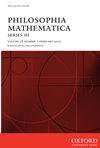数学中合理的认识论排除
IF 0.6
1区 哲学
Q2 HISTORY & PHILOSOPHY OF SCIENCE
引用次数: 0
摘要
谁能为认知共同体的知识生产做出贡献?学术界关注的是不合理的排斥形式。在这里,我通过研究数学中所谓的“怪人”现象来研究合理的排除形式。我认为,工作量管理方面的考虑证明了将这些外部人员排除在数学知识制造实践之外是合理的。我的讨论揭示了三点见解。除了不正确的数学论证之外,还有其他原因可以证明排除在数学实践之外。在某些情况下,数学家甚至有理由拒绝正确的数学论点。最后,数学家发现数学怪癖的方式并不支持“怪癖”术语的贬义含义。本文章由计算机程序翻译,如有差异,请以英文原文为准。
Justified Epistemic Exclusions in Mathematics
Who gets to contribute to knowledge production of an epistemic community? Scholarship has focussed on unjustified forms of exclusion. Here I study justified forms of exclusion by investigating the phenomenon of so-called ‘cranks’ in mathematics. I argue that workload-management concerns justify the exclusion of these outsiders from mathematical knowledge-making practices. My discussion reveals three insights. There are reasons other than incorrect mathematical argument that justify exclusions from mathematical practices. There are instances in which mathematicians are justified in rejecting even correct mathematical arguments. Finally, the way mathematicians spot mathematical crankery does not support the pejorative connotations of the ‘crank’ terminology.
求助全文
通过发布文献求助,成功后即可免费获取论文全文。
去求助
来源期刊

Philosophia Mathematica
HISTORY & PHILOSOPHY OF SCIENCE-
CiteScore
1.70
自引率
9.10%
发文量
26
审稿时长
>12 weeks
期刊介绍:
Philosophia Mathematica is the only journal in the world devoted specifically to philosophy of mathematics. The journal publishes peer-reviewed new work in philosophy of mathematics, the application of mathematics, and computing. In addition to main articles, sometimes grouped on a single theme, there are shorter discussion notes, letters, and book reviews. The journal is published online-only, with three issues published per year.
 求助内容:
求助内容: 应助结果提醒方式:
应助结果提醒方式:


